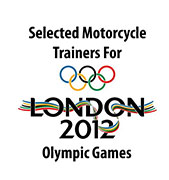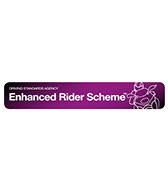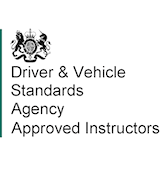Can you fail a CBT test?
Published, Dec 5, 2020
CBT is not a test, so the short answer to this question is No. However, CBT is still an assessment, and while there may not necessarily be a "Pass" or "Fail", not every rider is guaranteed to meet the standard required in order to successfully complete the assessment, and gain the certificate awarded at the end of the course.
Is CBT a guaranteed pass?
Because of the reasons mentioned above, many people still get confused over the question of "can i fail my CBT test"? and believe that because there is not a "Pass" or "Fail", that they are guaranteed to successfully complete their CBT course.
Remember, although CBT is not classified as a "Test", it is still an assessment, which can only go one of two ways; either "successful" or "unsuccessful". More often than not, and for no other reason than simplicity, these words often get replaced with "Pass" or "Fail"
What happens if I fail my CBT?
Should you be unsuccessful with your CBT assessment, then you can simply re-take the assessment again at anytime you choose. Unfortunately, as spaces on each assessment course are limited, you will be required to remit another course fee to re-attend. We do strongly recommend that before re-attending, that you take the necessary precautions to rectify any faults identified by your instructor from your previous assessment(s) to help ensure that you are more successful next time around.
What are the reasons for failing CBT?
There are numerous reasons to why you may fail a CBT test, but the most common problems are as follows:
Arriving Late To Your Course
CBT is a legal requirement for people to be able to ride a motorcycle, scooter or moped on the road in the UK. As such, the CBT course has legal requirements attached to it as well, and the first is that all students MUST be present for the entirety of the course. We ask students to arrive 15 minutes before the start of their course, but encourage you to arrive even earlier if possible, and to take unforeseen travel delays into consideration when planning your journey.
Any late comers will not be allowed participate in the curse, and will forfeit any monies paid if they arrive late. Our instructors will not, and cannot breach DVSA rules by allowing late comers to join the course part way through, and will not waste their time, or any other students time to repeat part of the course which may have been missed. Remember, our obligation is to provide you the course; your obligation is to arrive on time and satisfy the course criteria.
Not Being Able To Speak And Understand English
The CBT course is taught in English. As such, all participants must be able to converse (speak as well as understand) to a conversational standard. While we fully accept that England is a diverse country, with many of our instructors diverse heritage themselves, CBT is a group session, and will therefore be taught in one language, which is English.
All students need to be able to understand what is being taught and explained to them, both for their own safety, and to satisfy the requirements of the course as stipulated by the DVSA. Our instructors confirm and validate students understanding by way of question and answer (Q&A), and as such, students who are unable to converse, cannot satisfy this requirement, and therefore will be unable to continue any further with the course.
As part of the CBT, you will be required to undertake a minimum 2 hour road ride, with your instructor being in radio communication with up to 2 students. As such, it is imperative that the instructor is satisfied that the students understand instantly and immediately what is being said/instructed to them, as failure to comprehend such information may jeopardise the safety of yourself, and/or a third party.
Due to the nature of the course, translators are strictly prohibited. We urge you not to book a course if you cannot converse in English to a conversational standard, since failure to meet this requirement will result in your course being terminated and no refund being issued.
Not Being Able To Demonstrate Balance Or Control
Unsurprisingly, in order to ride a motorcycle, scooter or moped requires the rider needs to be able to balance on 2 wheels. A good indication of this (but not a guarantee) is having the ability to ride a bicycle. Even people that can balance may still have co-ordination problems using the controls. Ultimately, all our instructors can do is verbally teach you how to use the controls. Unfortunately there is no magic way that we can make you balance, or make you have the co-ordination required to ride safely and under control.
While we appreciate that if it is your first time riding, and you too may be unsure of whether you have the balance and co-ordination required to successfully complete the CBT course, the only way to establish this is to give it try, but having the ability to competently ride a bicycle will certainly help.
Unfortunately, if you cannot show balance and control of your bike, then our instructors will be left with no choice other than to terminate your course at that stage before your lack of control leads to an accident which may result in injury to yourself and/or a third party.
For those people who are struggling with balance or co-ordination issues, the advice is generally to get more practice on a bicycle, as once the balancing becomes more instinctive, your concentration can be directed more towards the co-ordination and use of controls. If your balance is ok, but you are still struggling with the co-ordination or use of controls, then our instructor may well recommend you booking one of our 1-2-1 sessions where the instructor attention is solely on you, and overcoming any difficulties you may be experiencing, rather than the instructor having to split the time and attention equally amongst other members of the class in a group CBT environment.
Not Understanding The Highway Code
CBT involves our instructors making a decision on whether you are safe to ride on the road independently. Therefore, logic dictates that if you do not understand the highway code (rules of the road), in particular, road signs, road markings and traffic procedures (such as where to give way and roundabout procedures), then you simply cannot be safe to ride on the road.
As well as a pre-requiste of the CBT course, having read and understood the Highway Code is a requirement you must meet even before applying for a provisional licence. Our instructors are not obliged during CBT to teach you the Highway Code, but instead required by the DVSA to assess your knowledge of it is to a satisfactory standard in order to progress to the road ride Element of the syllabus. If your theoretical knowledge of the Highway Code is not at a respectable standard, then our instructors will terminate your course at this point, and not allow you to continue onto the Practical on Road Element of the CBT, as this introduces an immediate and serious risk to yourself and third party members of the public, especially when you are unable to explain and demonstrate in theory, what you should be doing in practice.
Showing Poor Road Traffic Procedure
Remember, CBT is an assessment of your suitability to ride independently as a learner motorcyclist on UK roads. Just like if you cannot show a good theoretical knowledge of the Highway Code and Road traffic procedure as mentioned above, if you show poor practical riding decisions during the Road Ride assessment, then the instructor will not be awarding you a certificate at the end of the course.
Featured Services
Professional training services offered for all types of licence requirements, including advanced training, and assessments for compliance and auditing purposes
Testimonials
Superb instructors!
Having never ridden a bike before, these guys have turned me into a fully fledged biker. Thank you so much!
The only place to get professional training!
Did my bike and LGV training here...superb!
First time test passes is what these guys specialise in
Don't hesitate...let these guys educate.
Well organised and professional
Fantastic training............... Passed first time!
Really good instruction, especially the 121 session.
'Top Instructors....Top School!
Both modules passed first time, says it all!
'How a training school should be run!'
I now know the reviews are right







